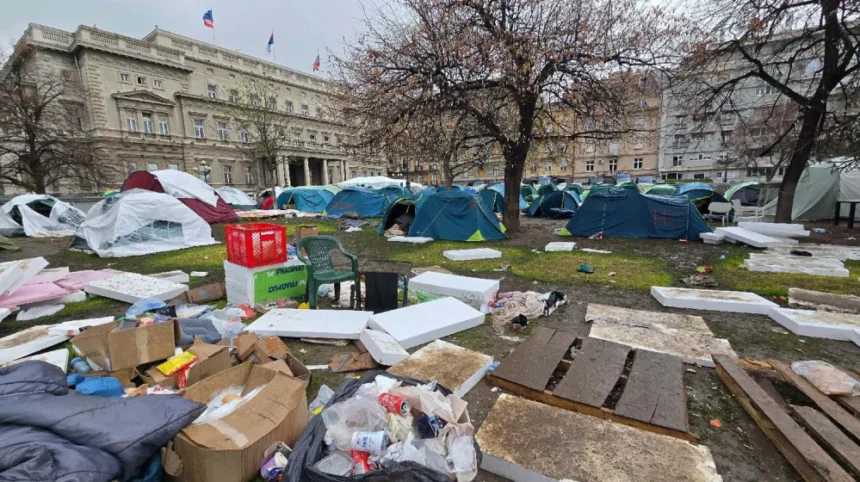For six months, tents have occupied Pioneer Park in Belgrade, later expanding to large white tents directly in front of the National Assembly. What began as a supposed protest of “students who want to study” has transformed into a controversial site now widely known as “Ćacilend.”
From Student Camp to Political Stronghold
Initially presented as a student protest camp, Ćacilend has gradually shifted its image. Today, critics argue it looks less like a student initiative and more like a paramilitary-style base, fenced off, smeared with grease to deter outsiders, and protected around the clock by heavy police forces. Journalists have been frequent targets of violence, while individuals from the criminal underworld and even convicted war criminals have been seen visiting the camp.
Admission from Within the Ruling Party
Senior SNS official Vladimir Đukanović openly admitted that Ćacilend was crucial in preventing what he described as an “attempted color revolution.” He emphasized that without it, opposition groups could have occupied central institutions, including the Assembly and the Presidency.
Legal Perspective: “A Political Stage”
Lawyer Vladimir Terzić described Ćacilend as a political theater, calling it a fragile illusion of power maintained by police protection. He stressed that while the authorities suppress peaceful constitutional protests across Serbia, they allow a months-long blockade in central Belgrade because it benefits the regime.
“If real support existed, there would be no need for police cordons. This stage will collapse like a house of cards once political winds shift,” Terzić warned.
Analysts: Regime’s Multi-Purpose Project
Political analyst Đorđe Vukadinović labeled Ćacilend a multi-purpose regime project, noting its transition from a failed “student oasis” into a symbol of SNS defiance and provocation. According to him, if the regime ultimately prevails, Ćacilend will be remembered as the birthplace of its victory. Otherwise, it will remain a symbol of shame and political decay.
Financial Burden: “A Potemkin Village”
Law professor Bojan Pajtić condemned Ćacilend as a costly Potemkin village, funded by taxpayers. He revealed that millions of euros have been spent to maintain the camp, with participants allegedly paid to stay there. Pajtić criticized the police’s selective enforcement, pointing out that while peaceful opposition protests are suppressed, the ruling party’s supporters are allowed to maintain a disruptive occupation in the heart of Belgrade.







